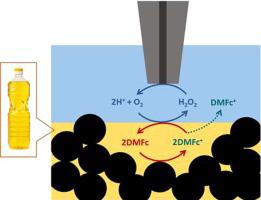当前位置:
X-MOL 学术
›
Electrochem. Commun.
›
论文详情
Our official English website, www.x-mol.net, welcomes your feedback! (Note: you will need to create a separate account there.)
Electrocatalysis at vegetable oil water interface
Electrochemistry Communications ( IF 4.7 ) Pub Date : 2024-03-03 , DOI: 10.1016/j.elecom.2024.107694 Aleksandra Siwiec , Katarzyna Dusilo , Monika Asztemborska , Marcin Opallo
Electrochemistry Communications ( IF 4.7 ) Pub Date : 2024-03-03 , DOI: 10.1016/j.elecom.2024.107694 Aleksandra Siwiec , Katarzyna Dusilo , Monika Asztemborska , Marcin Opallo

|
Biphasic oxygen reduction and hydrogen evolution are studied for almost two decades, because of favourable overpotential decrease as compared to aqueous solution. Until now, polar solvents (ε > 7) were employed as organic phase in these studies. Here, we applied non polar vegetable oils (rapeseed, linen or sunflower) for biphasic HO generation by oxygen reduction. This product was detected at oil|aqueous acid solution interface by scanning electrochemical microscopy, when electron donor – decamethylferrocene, was electrochemically recycled. Ejection of small fraction of decamethylferrocenium cation from oil to aqueous phase was also noticed.
中文翻译:

植物油水界面电催化
由于与水溶液相比,双相氧还原和析氢具有有利的过电势降低,因此人们对双相氧还原和析氢进行了近二十年的研究。到目前为止,这些研究中均采用极性溶剂(ε > 7)作为有机相。在这里,我们应用非极性植物油(油菜籽油、亚麻油或向日葵油)通过氧还原产生双相 H2O。当电子给体——十甲基二茂铁进行电化学回收时,通过扫描电化学显微镜在油/酸溶液界面检测到该产物。还注意到小部分十甲基二茂铁阳离子从油相喷射到水相。
更新日期:2024-03-03
中文翻译:

植物油水界面电催化
由于与水溶液相比,双相氧还原和析氢具有有利的过电势降低,因此人们对双相氧还原和析氢进行了近二十年的研究。到目前为止,这些研究中均采用极性溶剂(ε > 7)作为有机相。在这里,我们应用非极性植物油(油菜籽油、亚麻油或向日葵油)通过氧还原产生双相 H2O。当电子给体——十甲基二茂铁进行电化学回收时,通过扫描电化学显微镜在油/酸溶液界面检测到该产物。还注意到小部分十甲基二茂铁阳离子从油相喷射到水相。











































 京公网安备 11010802027423号
京公网安备 11010802027423号